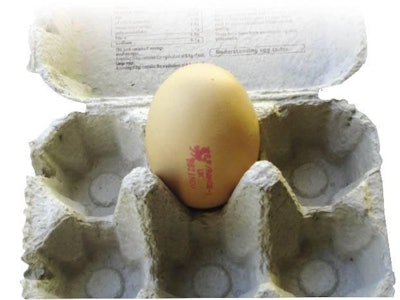
Just when things were looking sunny side up' for the British egg industry last year, the national press delivered two cracking blows. Firstly, the Food Standards Agency (FSA) published its findings of a salmonella survey on eggs imported into the UK. Second, the Department of the Environment, Food and Rural Affairs (DEFRA) announced it had found forged and fraudulent Lion Quality' code of practice marks used to pass off imported cage eggs as British free-range eggs.
Salmonella survey
An estimated 3.3% of the 1744 imported (six-egg) boxes tested by the FSA carried external eggshell contamination and 10 also contained salmonella inside eggs. Eggs produced in Spain had the highest incidence of contamination (12.5% of boxes), followed by France way down at 0.6%. The main culprit was Salmonella enteritidis, which is a known cause of food poisoning in humans. The reaction of the British press was predictable: Danger in millions of eggs from abroad', for example, was the headline on the front page of the Daily Express.
The real surprise was the time taken to extrapolate the extent of the problem given European Food Safety Authority findings from layer flock surveys across Europe last summer. It reported that Spain had some of the highest incidences of salmonella on farms. With around one in ten of eggs consumed in the UK imported many from Spain the DEFRA results were inevitable.
In the UK, most imported eggs are used in processed foods and catering, particularly egg sandwiches. Significant numbers are sold by some independent shops and discount chains but rarely in supermarkets. Spanish eggs were linked with a food poisoning outbreak in 2006 at a London caf, claimed the British Egg Information Service. Over 30% of the eggs used by that outlet tested positive for salmonella.
British egg producers remember only too well the first salmonella scare and its consequences, following comments by Edwina Currie (then Health Minister) made in 1988 that "most of Britain's layer flocks were contaminated with salmonella".
The now infamous allegation almost destroyed the country's egg industry overnight. Although UK flocks were as clean as any in the world at that time, the episode cost the industry very dearly and brought about many changes, both indirectly and directly. One indirect change was a surge in demand for free-range eggs, which now account for 35% of the market. In recent years, two supermarket chains have stopped selling cage eggs altogether and insist that only free-range eggs are used in their own brand prepared food lines.
The most significant direct change in the industry was the imposition of a stringent salmonella management and control programme, including vaccination of all birds against Salmonella enteritidis.
Lion Quality
The Lion Quality Code of Practice was introduced in 1998 to ensure that eggs have been produced to the highest standards of food safety in the world. The measures include the compulsory vaccination against Salmonella enteritidis of all pullets destined for Lion egg-producing flocks, independent auditing improved traceability of eggs and a best-before' date stamped on the shell and pack which shows that they are fresher than required by law, as well as on-farm and packing station hygiene controls.
The Lion Quality mark is a registered trademark and it can only be used by subscribers to the British Egg Industry Council on eggs that have been produced in accordance with UK and EU law and the Lion Quality Code of Practice. The mark now appears on 85% of UK eggs.
Since its introduction in 1998, the Lion Mark has been successful in restoring confidence in the industry. In 2001, the Advisory Committee on the Microbiological Safety of Food published a report highlighting the effectiveness of poultry vaccination in reducing human salmonella cases by half. The Mark's success was reinforced by the Food Standards Agency, which reported in 2004 that no salmonella had been found in any of the 28,000 UK-produced eggs tested.
In addition to the Lion Quality Mark and in line with EU regulations, the great majority of eggs sold commercially in the UK are individually stamped with a series of characters indicating the country of origin, production system (cage, barn, free-range, organic) as well as a five-digit number for egg traceability and producer identification and a best before date' for freshness and quality.


















